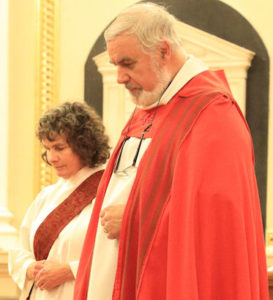 From here:
From here:
Dennis Drainville, retired bishop of the diocese of Quebec, is re-entering politics by running for the Green Party of Canada in this fall’s federal election.
Drainville, who retired as bishop in 2017, announced June 5 he would be running for the Greens in the riding of Gaspésie-Les Îles-de-la-Madeleine, which covers a swathe of the Gaspé Peninsula as well as the Magdalen Islands.
Drainville, who served as a member of Bob Rae’s NDP government in Ontario 1990-93, says he’s been involved in politics in some capacity his entire life, so that returning to it feels second-nature to him. His decision to re-enter now, he says, was spurred by a realization that the coming vote, scheduled for Oct. 21, will be “an election like no other,” because it will require momentous decisions to be made on how to deal with the twin threats of climate change and unethical government.
Drainville was Bishop of the Diocese of Quebec between 2009 and 2016 during which time around two thirds of the parishes were closed, sold or amalgamated. I don’t think this was all the bishop’s fault but it’s hard not to look at this as an example of reverse evangelism.
Following this ecclesiastical success, he is setting his sights on something easier: solving climate change and reforming unethical government.
The Occupy Movement (remember that?) reveals where Drainville’s political sympathies lie: with the 99% (we) and against the 1% (they) even though, on a bishop’s salary, he was almost certainly in the 10% category and consequently had more than a toe in the “they” camp. Perhaps he will find people to Occupy all the empty churches in the Diocese of Quebec.
The Occupy movement has created a focused public debate on economic and political institutions and provided “a new and powerful critique” of them, says Bishop Dennis Drainville of the diocese of Quebec.
Invited to speak at various events Sept. 28-30 sponsored by Occupy Nova Scotia and churches in Halifax, Drainville noted that the anti-capitalist movement that spread around the world in 2011 has brought new awareness to the notion that ‘They are the 1 per cent and we are the 99 per cent,’ ” Drainville told those attending his lecture at the Atlantic School of Theology. “This formula underlines the structural inequalities of our political and economic system and highlights the collusion between the corporate and political elites,” he said.


 Drainville said, however, that in the overwhelming majority of cases, decisions in the diocese of Quebec are made by consensus among members of the leadership team. The team rose to many challenges facing the diocese during his episcopacy admirably, he said. “They are the finest team I have ever worked with in my life. And I don’t expect I’ll ever see a team that is as good and committed and engaged.”
Drainville said, however, that in the overwhelming majority of cases, decisions in the diocese of Quebec are made by consensus among members of the leadership team. The team rose to many challenges facing the diocese during his episcopacy admirably, he said. “They are the finest team I have ever worked with in my life. And I don’t expect I’ll ever see a team that is as good and committed and engaged.”